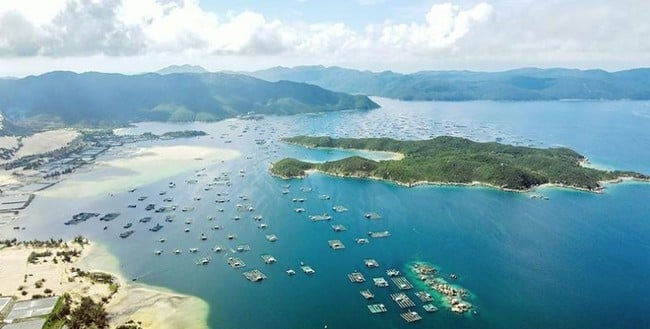June 7, 2025 | 08:43 GMT +7
June 7, 2025 | 08:43 GMT +7
Hotline: 0913.378.918
June 7, 2025 | 08:43 GMT +7
Hotline: 0913.378.918
The Khanh Hoa Provincial People's Committee has recently issued a Plan to implement Resolution No. 37/NQ-CP, dated May 27, 2025, by the Government regarding the Implementation Plan for the National Marine Spatial Planning for the period 2021–2030, with a vision to 2050
Accordingly, for key tasks to be carried out by 2030, Khanh Hoa province will focus on coordinating with ministries, sectors, and central agencies to implement the main task groups specified in Resolution No. 37/NQ-CP. At the same time, the province will proactively carry out specific groups of tasks within its jurisdiction. These include: finalizing spatial and land-use planning; developing coastal, marine, and island infrastructure; promoting sustainable marine economic development aligned with green growth, circular economy models, and low-carbon principles; ensuring environmental protection and the conservation of marine biodiversity; fostering scientific and technological research as well as training and developing high-quality human resources in the fields of marine and island management; and preparing detailed land-use plans for both coastal areas and islands.
Notably, in terms of promoting a green and low-carbon marine economy, the Provincial People’s Committee has assigned the Department of Agriculture and Environment to lead, in coordination with relevant departments and coastal localities, the effective implementation of the pilot project for high-tech marine aquaculture in Khanh Hoa - approved by the Prime Minister under Decision No. 231/QD-TTg dated January 24, 2025, and specified by the Provincial People’s Committee in Plan No. 1884/KH-UBND.

The People’s Committee of Khanh Hoa Province has requested coastal localities to accelerate the development of islands in alignment with a green, circular, and low-carbon economy, with high resilience to climate change, while also integrating efforts to ensure national defense and maritime security. Illustrative image.
In addition, the Khanh Hoa Provincial People's Committee has assigned the Department of Agriculture and Environment to implement the Plan for combating illegal, unreported, and unregulated (IUU) fishing within the province. This plan is expected to contribute significantly to the sustainable development of the fisheries sector while ensuring the province’s international integration.
The Department of Culture, Sports, and Tourism has been tasked with preparing the dossiers for the inventory, classification, and ranking of heritage sites at the provincial, national, and special national levels. At the same time, the department is responsible for cataloging and proposing the inclusion of intangible cultural heritage elements into the National List of Intangible Cultural Heritage, as well as for recognition as world heritage and documentary heritage. From this, the province will continue to preserve and promote the value of heritage, historical traditions, and marine cultural identity, while building a society that is closely connected to and friendly with the sea.
Particularly, the Khanh Hoa Provincial People's Committee has emphasized the need for coastal localities to accelerate the development of islands in alignment with a green, circular, and low-carbon economic model. This development approach must ensure high resilience to the impacts of climate change while also strengthening national defense and maritime security.
Translated by Phuong Linh

(VAN) VAAS and numerous Vietnamese enterprises have signed cooperation agreements with Japanese partners to promote agricultural technology and trade connectivity.
/2025/05/29/5625-12-214801_567.jpg)
(VAN) Provincial mergers in the Mekong Delta promise to streamline administration, expand inter-provincial raw material areas, and foster close linkages in agricultural value chains, benefiting both businesses and cooperatives.

(VAN) Merging Mekong Delta provinces contributes to the expansion of agricultural raw material areas, addressing previous constraints caused by provincial boundaries. Additionally, this expansion will reduce costs and strengthen linkages between businesses, cooperatives, and farmers.
/2025/05/29/1043-2-153730_145.jpg)
(VAN) The Government's policy to merge provincial-level administrative units opens up major opportunities for the Mekong Delta region to reshape its agricultural development strategy toward large-scale production, effective regional linkages, and sustainability.

(VAN) The mutual export of agrifood products between the European Union (EU) and the United Kingdom (UK) must occur again without certification, border controls or other red tape. This was agreed at the UK-EU summit.
/2025/05/22/5121-2-173645_677.jpg)
(VAN) NBSAP Tracker identifies strengths and areas for improvement in the National Biodiversity Strategy, based on each region’s priorities and capacities.

(VAN) The draft amendment to the Circular on rice export trading stipulates a periodic reporting regime for rice exporting enterprises.